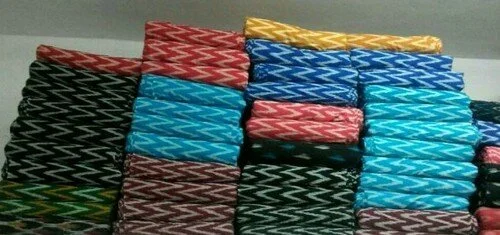National Day Handloom Day | Destinations to add to your bucket list for homegrown handlooms
/This National Handloom Day, here are some destinations to add to your bucket list for homegrown handlooms
7th August 2015 was declared as National Handloom Day with an aim to generate awareness around the importance of the handloom industry in India. Being celebrated in its 7th year, this day also focuses on the contribution of handloom to the socio-economic development of the country and increase the income of the weavers. From Madhya Pradesh’s Maheshwari handloom to Karnataka’s Ilkal fabric, Booking.com, the leading travel brand, has curated a list of destinations for fabric, fashion, and handloom loyalists to visit and shop the most exquisite fabrics as and when it’s safe to do so.
1. Maheshwar (Madhya Pradesh) for Maheshwari handloom
Home to India’s richest handloom fabric traditions, Maheshwar is a small town in the city of Khargone district in Madhya Pradesh. The history of the fabric dates back to the 18th century when its intricate design became a huge hit amongst the royal circle. This fine handloom today not only represents Indian handlooms at an international market but also promotes the craftsmanship of Indian laborers. Travelers visiting Maheshwar must definitely get their hands on colorful Maheshwari sarees. While in Maheshwar, travellers can also visit the Ahilya Fort situated on the banks of Narmada, Holkar fort and the famous Rajwada.
2. Ilkal (Karnataka) for Ilkal handloom
Located in the Bagalkot district of Karnataka, Ilkal is an ancient weaving center famous for its Ilkah handloom. Travellers visiting Ilkal will be fascinated with the detailing of the saree which is made with a technique called Tope Teni, where the pallu is weaved with the body of the saree. Ilkal saree also takes its name from the town of Ilkal and the distinctive feature of Ilkal sarees is the use of a form of embroidery called Kasuti. The designs used in Kasuti reflect traditional patterns like palanquins, elephants, and lotuses which are embroidered onto Ilkal sarees. After trying on Ilkal sarees, travellers can also explore the city of Ilkal by visiting Banashankari Temple, Badami Cave temple, Lad Khan temple, and Durga Temple.
3. Sualkuchi (Assam) for Golden Muga Silk
Situated on the northern banks of the Brahmaputra, Sualkuchi is famous for its centuries-old heritage of weaving. Other than the picturesque tea gardens, the beautiful monasteries, and delicious local food, travelers should visit the village of Sualkuchi and shop the lovely Muga silk. This rare form of quintessential fabric has gained popularity and has been worn by women for centuries. The gorgeous fabric is known for its extreme durability and natural yellowish-golden tint. Legends have it that it was once only reserved for the ladies of the royal family. In fact, it is often compared to being as expensive as buying gold.
4. Bishnupur (West Bengal) for Baluchari sarees
The word ‘Baluchari’ means sandy river bank, signifying the origins of the handloom to a small village called Baluchar situated on the banks of the river Bhagirathi. The handloom is known for its depictions of mythological scenes on the pallu of the saree. Located in West Bengal, Bishnupur is a small town that is currently the only place where one can find authentic Baluchari sarees. When it is safe to travel, one can visit Bishnupur to add Baluchari saree to their collection. Bishnupur is also home to temples, heritage sites and museums which can make your trip a memorable one.
5. Patan (Gujarat) for Patola saree
Patola, a double ikat woven saree, translates into ‘Queen of Silk’ and is one of the finest silk sarees produced in Patan, known to be a capital of Gujarat in medieval times. The history of the Patola sarees date back to the 12th century, where it is said that the handloom craft was introduced by the salvi caste who are believed to migrate to Gujarat with the intention of acquiring the patronage of the Solanki Rajputs, who used to dress in patola silk themselves on special occasions. The patola saree is quite an expensive handloom due to the nature of its technique, and is today manufactured only by a handful of weavers in Patan. Patan has an old world charm, where travellers can find beautiful attractions like Jain temple, Hemachandracharya Gyan Mandir, Khan Sarovar, Rani ki Vav and Sahastrilanga Talav.












